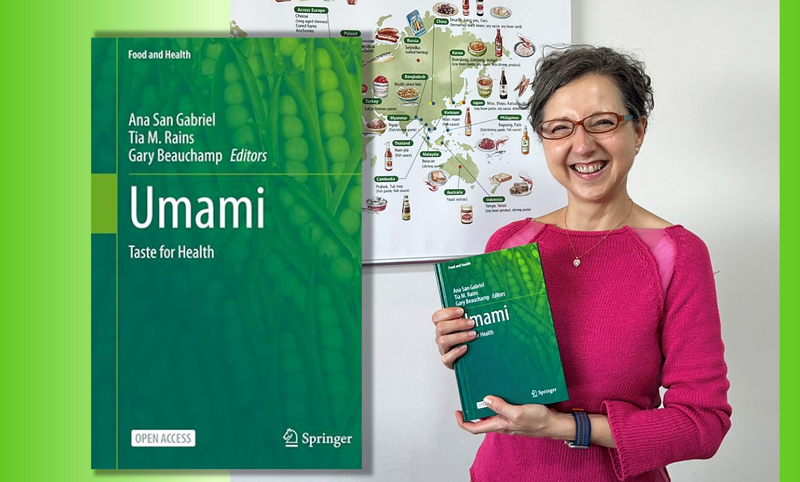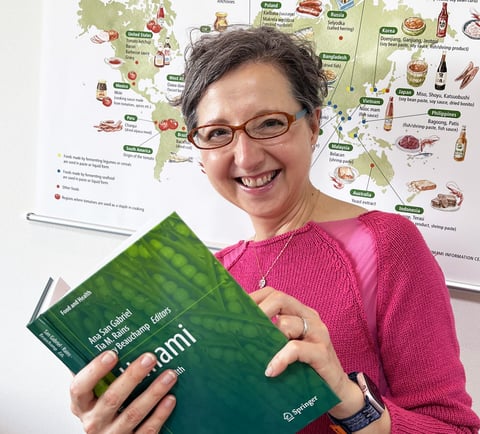Springer issued “Umami - Taste for Health”
November 2023

Springer Science + Business Media, a Germany based publisher in science, humanities, technical and medical (STM) launched a new book on umami “Umami – Taste for Health” (Ana San Gabriel、Tia M. Rains、Gary Beauchamp.)
Over the past century, hundreds of studies have explored the mechanistic underpinnings of the taste, leading to the characterization of the umami taste receptor in 2002.
How this fifth basic taste figures into nutrition and health, however, remains underexplored.
Umami: Taste for Health is written by the scientists and the chefs who have been involved in the research and closer understanding of umami taste and its function in food perception and physiology. The publication was supported by the International Glutamate Information Service (IGIS)*, a global organization that disseminates the benefits of glutamate and umami to the world.
*The International Glutamate Information Service (IGIS). https://glutamate.org/about/
It provides an overview of the relationship between umami and human health. Authors explain how glutamate not only produces a characteristic oral sensation in the mouth but also functions as a signaling molecule to induce physiological responses.
With the support of recent studies, the book demonstrates how the taste properties of umami make glutamate a promising substance to lower salt intake, promote satiation and support healthier aging. The text also covers practical culinary applications to increase umami flavor and practical usage of umami for promoting healthy eating.
The book has been published as a print book as well as an open access e-book to make it accessible to a wider audience.
You can read it for free at the URL below.
https://link.springer.com/book/10.1007/978-3-031-32692-9
The chapters and authors are as follows (The contributors' positions are as of the publication of the book.);
1. Introduction: Umami as a Taste Percept:
by Gary Beauchamp (Monell Chemical Senses Center, Philadelphia, PA, USA)
2. Umami and MSG: by Ryusuke Yoshida (Okayama University, Okayama, Japan) Yuzo Ninomiya (Kyushu University, Fukuoka, Japan)
3. Umami Taste Signaling from the Taste Bud to Cortex:
by Eugene R. Delay (Regis University, Denver, CO, USA, Emeritus Faculty at the University of Vermont in Burlington, Burlington, VT, USA)
Stephen D. Roper (Department of Physiology and Biophysics and the Department of Otolaryngology, Miller School of Medicine, University of Miami, Coral Gables, FL, USA)
4. Umami and Salty: A Cooperative Pair:
by Aubrey Dunteman (University of Illinois, Urbana, IL, USA)
Soo-Yeun Lee (University of Illinois, Urbana, IL, USA)
5. Umami and Satiety:
by Martin R. Yeomans (University of Sussex, Brighton, UK)
6. Umami Taste: Inborn and Experiential Effects on Taste Acceptance and Satiation During Infancy:
by Ana San Gabriel (Global Communications, Ajinomoto Co., Inc., Tokyo, Japan)
Julie A. Mennella (Monell Chemical Senses Center, Philadelphia, PA, USA)
7. Umami and Healthy Aging:
by Minoru Kouzuki (Tottori University, Tottori, Japan)
Katsuya Urakami (Tottori University, Tottori, Japan)
8. Umami Taste as a Component of Healthy Diets:
by Ana San Gabriel (Global Communications, Ajinomoto Co., Inc., Tokyo, Japan)
Tia M. Rains (Research and Development, Ajinomoto Health & Nutrition North America, Itasca, IL, USA)
9. Practicalities from Culinology®: How Umami Can Contribute to Culinary Arts and Sciences:
by Chris Koetke (Ajinomoto Health & Nutrition North America, Itasca, IL, USA),
Lauren Miller (Drexel University, Philadelphia, PA, USA)
Jonathan Deutsch (Drexel University, Philadelphia, PA, USA)
Dr. Ana San Gabriel, a UIC member, also participated as a cheifchief editor. She also authored chapters 6 and 8.
"This book resulted from many years of research and collaborations not only to understand better how we perceive umami taste but also to learn how umami substances change the perception of certain foods. The book gives me a sense of accomplishments because we could gather authors that have been deeply implicated historically in the science of umami. This work demonstrates that umami taste can help us eat healthful foods, low in salt and rich in vegetables, without losing the joy of eating while satisfying our feeling of fullness. I hope this read is useful for many and encourages further research on umami taste to continue promoting the pleasure to eat foods that are recommended to maintain healthy longevity."

